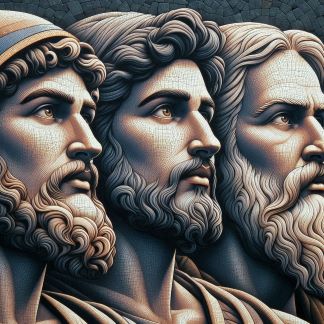Trusting in God’s Sovereignty: Lessons from David, Moses, & Abraham
It’s not about our own Abilities or Limitations but about God’s Power working through us.
If there’s one essential truth that believers, and indeed all humanity need to grasp,
it’s that God remains sovereign over every aspect of our lives, both on earth and beyond.
In every circumstance, we must learn to trust the One who possesses ultimate authority, guides us, sees us through,
and works everything together for our good.
We are never too self-sufficient or powerful to bypass God’s guidance or marginalize His presence in our lives.
While it’s true that God has empowered us to make decisions, establish and multiply on earth,
His instructions always come with a reassuring promise: ‘I am with you always.’
This subtle yet profound reminder underscores our inherent dependence on our Creator,
prompting us to trust in His sovereignty and continually seek His divine help.
Hence, regardless of our circumstances—whether we’re walking in blessing or navigating challenges,
our trust should remain steadfast in God’s sovereign plan for our lives, a plan rooted in goodness and not evil.
1 Samuel 17:37 KJV
[37] David said moreover, The LORD that delivered me out of the paw of the lion, and out of the paw of the bear, he will deliver me out of the hand of this Philistine. And Saul said unto David, Go, and the LORD be with thee.
https://bible.com/bible/1/1sa.17.37.KJV
The biblical accounts of David, Moses, and Abraham vividly illustrate this unshakeable trust in God’s sovereignty.
In this article, we’ll delve into their inspiring stories, exploring how their trust in God’s purpose shaped their lives and legacies.
Trusting in God’s Sovereignty: Lessons from David, Moses, & Abraham
DAVID
In the valley of Elah, the armies of Israel and Philistines faced off against each other.
The Philistine army was led by a giant of a man named Goliath, who stood over nine feet tall and wore armour that weighed over 125 pounds.
For 40 days, Goliath taunted the armies of Israel, challenging them to send a warrior to fight him one-on-one.
The Israelites were terrified of Goliath, and none of them dared to accept his challenge.
But David, a young shepherd boy who had been sent by his father to bring food to his brothers in the army, was not intimidated.
When David heard Goliath’s taunts, he became angry and asked the Israelites why no one was willing to fight the giant.
The Israelites told David that Goliath was too powerful and that anyone who fought him would surely be killed.
But David was not fearful.
He knew that God was with him and that He would give him the strength and courage he needed to defeat Goliath.
David told King Saul, the leader of the Israelites, that he was willing to fight Goliath.
Saul was sceptical at first, but David assured him that God would be with him.
Saul reluctantly agreed to let David fight Goliath, and he offered David his armour to wear.
But David refused, knowing that he did not need armour to defeat the giant.
Instead, David went to the nearby stream and picked up five smooth stones.
He put them in his shepherd’s bag and, with his sling in hand, he approached Goliath.
The giant laughed at David, thinking that he was just a foolish little boy.
But David was not afraid. He knew that God was with him, and he trusted in His power.
David told Goliath that he came in the name of the Lord of hosts, the God of the armies of Israel and that he would defeat the giant and cut off his head.
Goliath cursed David and his God, but David was not intimidated.
With a swift motion, David put a stone in his sling and hurled it at Goliath.
The stone hit the giant right between the eyes, and he fell to the ground, defeated.
The Philistine army fled in terror, and the Israelites cheered as David stood victorious over the body of Goliath.
David’s victory over Goliath was not just a testament to his own bravery and skill,
but also to the power and faithfulness of God.
David knew that he could not have defeated the giant on his own, but with God’s help, he was able to accomplish the impossible.
As the Israelites celebrated their victory, David gave all the glory to God, saying,
“The Lord who delivered me from the paw of the lion and the paw of the bear will deliver me from the hand of this Philistine.”
David’s faith and trust in God had given him the courage and strength he needed to defeat the giant,
and he knew that he could always rely on God to help him in times of need, even if he had previous experiences in killing a lion and a bear.
Trusting in God’s Sovereignty: Lessons from David, Moses, & Abraham
MOSES
Moses was standing before the burning bush, conversing with God, who had just instructed him to go to Pharaoh and demand that he let the Israelites go.
But Moses was hesitant, feeling inadequate for the task.
“Lord, I’m not a good speaker,” Moses complained. “I’ve always struggled with words.
How can I possibly go before Pharaoh and convince him to let the Israelites go?”
God replied, “Who gave you your mouth? Who made you? I will be with you, and I will teach you what to say.”
But Moses continued to express his doubts. “Lord, please send someone else,” he pleaded.
God’s response was firm but gentle. “I will be with you, Moses. I will help you speak, and I will perform miracles through you.
You will see that I am the Lord and that I will set the Israelites free from Pharaoh’s bondage.”
Despite God’s reassurances, Moses still felt uncertain.
But he knew that he couldn’t disobey God’s command.
So, with a sense of trepidation, Moses set out on his journey to Egypt.
When Moses arrived in Egypt, he went before Pharaoh, just as God had instructed him.
But Pharaoh was not interested in listening to Moses’ demands.
Instead, he refused to let the Israelites go and even increased their workload.
Moses returned to God, feeling frustrated and defeated.
“Lord, I did what you told me to do, but Pharaoh refused to listen. He’s even making things worse for the Israelites.”
God’s response was calm and reassuring.
“I know that Pharaoh is stubborn, but I will harden his heart even more.
And then, I will perform great miracles, and Pharaoh will know that I am the Lord. He will let the Israelites go, but not before I have shown my power and glory.”
And so, Moses continued to obey God’s instructions, even when things seemed impossible.
He performed miracles, such as turning his staff into a snake and causing his hand to become leprous, but Pharaoh still refused to listen.
It wasn’t until God sent ten plagues upon Egypt, culminating in the death of every firstborn son, that Pharaoh finally relented.
The Israelites were instructed to mark their doorposts with the blood of a lamb so that the angel of death would pass over their homes.
As the Israelites prepared to leave Egypt, Moses once again felt a sense of awe and wonder at God’s power and provision.
He knew that he had played a part in the Israelites’ deliverance,
but he also knew that it was God who had done the real work.
As the Israelites crossed the Red Sea, with the waters parting to let them through, Moses sang a song of praise to God.
“The Lord is my strength and my song,” he sang. “He has become my salvation. He is my God, and I will praise him.”
Moses’ dependence on God had been the key to the Israelites’ deliverance.
He had learned to trust in God’s power and provision, even when things seemed impossible.
And as he looked out at the Israelites, safe on the other side of the Red Sea,
he knew that he would never forget the lessons he had learnt on this journey—Trusting In God!
Trusting in God’s Sovereignty: Lessons from David, Moses, & Abraham
ABRAHAM
Abraham, a righteous man and a faithful follower of God, had been promised by God that he would be the father of a great nation.
God had miraculously provided Abraham and his wife, Sarah, with a son, Isaac, despite their advanced age.
Years later, God tested Abraham’s faith in a dramatic and challenging way.
One day, God spoke to Abraham, saying, “Take your son, your only son, Isaac, whom you love, and go to the region of Moriah.
Sacrifice him there as a burnt offering on one of the mountains I will tell you about.”
Abraham was shocked and devastated by God’s request.
How could God ask him to sacrifice his own son, the child of promise?
But Abraham did not hesitate or question God’s instructions.
Instead, he chose to trust and obey God, even when it seemed impossible and went against his own desires.
Early the next morning, Abraham set out on the journey to Moriah with Isaac and two servants.
As they approached the mountain, Abraham told the servants to wait while he and Isaac went to worship.
Isaac, unaware of the sacrifice that was to take place, carried the wood for the burnt offering on his back.
As they climbed the mountain, Isaac asked Abraham,
“Father, we have the fire and the wood, but where is the lamb for the burnt offering?”
Abraham replied, “God himself will provide the lamb for the burnt offering, my son.”
When they reached the top of the mountain, Abraham built an altar and arranged the wood on it.
Then, he bound Isaac and placed him on the altar, ready to sacrifice him as God had instructed.
Just as Abraham was about to slay Isaac, the angel of the Lord called out to him from heaven, saying,
“Abraham! Abraham! Do not lay a hand on the boy. Do not do anything to him.
Now I know that you fear God because you have not withheld from me your son, your only son.”
Abraham looked up and saw a ram caught in a thicket by its horns.
God had provided a substitute for Isaac! Abraham took the ram and sacrificed it as a burnt offering instead of his son.
Because of Abraham’s obedience and trust in God, the Lord blessed him and said,
“I swear by myself, declares the Lord,
that because you have done this and have not withheld your son, your only son,
I will surely bless you and make your descendants as numerous as the stars in the sky and as the sand on the seashore.
Your descendants will take possession of the cities of their enemies, and through your offspring, all nations on earth will be blessed, because you have obeyed me.”
Abraham’s obedience to God’s instructions, even when it seemed impossible and went against his own desires, demonstrated his deep trust and faith in God.
And as a result, God provided a ram as a substitute for Isaac and blessed Abraham,
fulfilling His promise to make him the father of many nations.
In conclusion, the stories of David, Moses, and Abraham demonstrate that God’s power ultimately prevails.
Our reliance on His guidance and strength is essential in all we do.
It’s not about our own abilities or limitations but about God’s power working through us.
To experience this power, we must acknowledge our dependence on Him and humbly receive His help.
When we trust in God, He will always come through for us. And as He promises, He will never test us beyond what we can bear.
Also Read: BreakThrough: When Fear Meets Faith – Diademng
Trusting in God’s Sovereignty: Lessons from David, Moses, & Abraham















